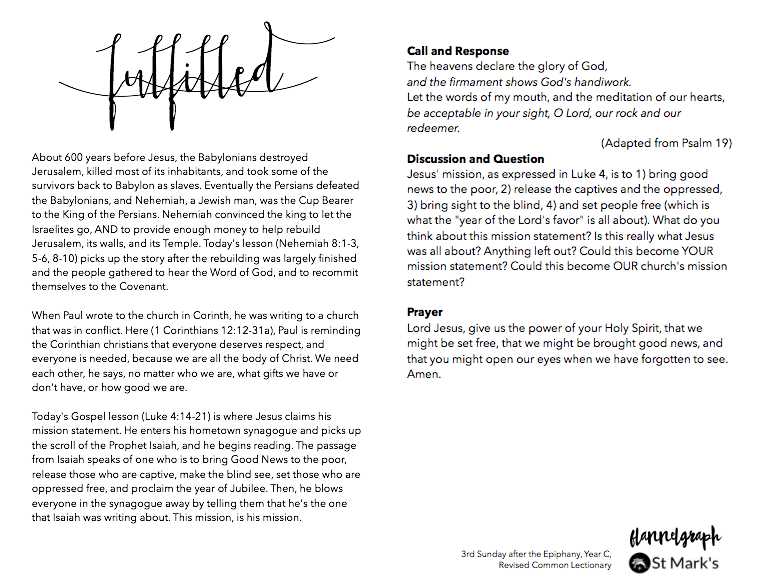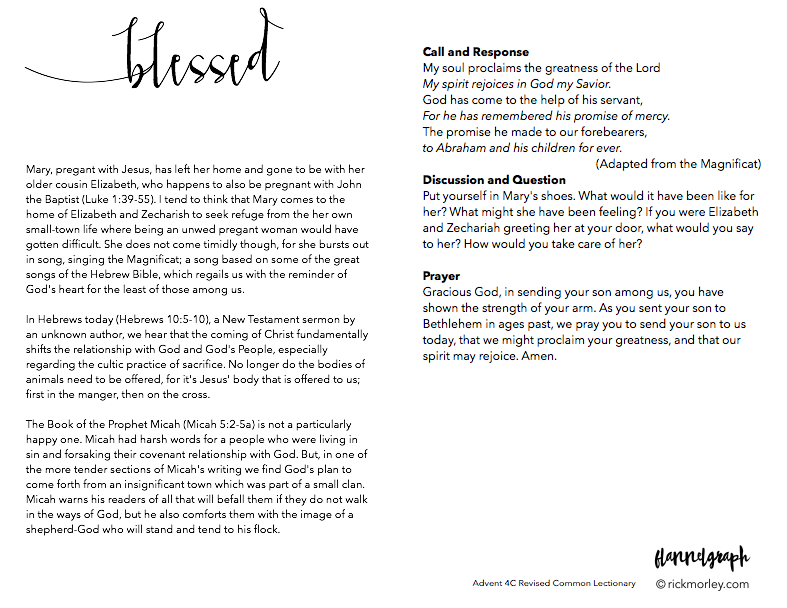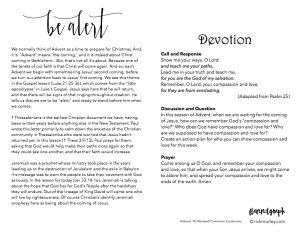flannelgraph: epiphany 3c
About 600 years before Jesus, the Babylonians destroyed Jerusalem, killed most of its inhabitants, and took some of the survivors back to Babylon as slaves. Eventually the Persians defeated the Babylonians, and Nehemiah, a Jewish man, was the Cup Bearer to the King of the Persians. Nehemiah
convinced the king to let the Israelites go, AND to provide enough money to help rebuild Jerusalem, its walls, and its Temple. Today’s lesson (Nehemiah 8:1-3, 5-6, 8-10) picks up the story after the rebuilding was largely finished and the people gathered to hear the Word of God, and to recommit themselves to the Covenant.
When Paul wrote to the church in Corinth, he was writing to a church that was in conflict. Here (1 Corinthians 12:12-31a), Paul is reminding the Corinthian christians that everyone deserves respect, and everyone is needed, because we are all the body of Christ. We need each other, he says, no matter who we are, what gifts we have or don’t have, or how good we are.
Today’s Gospel lesson (Luke 4:14-21) is where Jesus claims his mission statement. He enters his hometown synagogue and picks up the scroll of the Prophet Isaiah, and he begins reading. The passage from Isaiah speaks of one who is to bring Good News to the poor, release those who are captive, make the blind see, set those who are oppressed free, and proclaim the year of Jubilee. Then, he blows everyone in the synagogue away by telling them that he’s the one that Isaiah was writing about. This mission, is his mission.
Call and Response
The heavens declare the glory of God,
and the firmament shows God’s handiwork.
Let the words of my mouth, and the meditation of our hearts,
be acceptable in your sight, O Lord, our rock and our redeemer.
(Adapted from Psalm 19)
Discussion and Question
Jesus’ mission, as expressed in Luke 4, is to 1) bring good news to the poor, 2) release the captives and the oppressed, 3) bring sight to the blind, 4) and set people free (which is what the “year of the Lord’s favor” is all about). What do you think about this mission statement? Is this really what Jesus was all about? Anything left out? Could this become YOUR mission statement? Could this become OUR church’s mission statement?
Prayer
Lord Jesus, give us the power of your Holy Spirit, that we might be set free, that we might be brought good news, and that you might open our eyes when we have forgotten to see. Amen.
flannelgraph: baptism of Our Lord
The first forty chapters of Isaiah offer words of warning and doom to the people of God who had gone astray and were about to be punished by the Babylonians. Our lesson today from Isaiah (Isaiah 43:1-7) is part of the second part of the Book of Isaiah which is written to people who had already been taken off to Babylon as captives. His message to them here is “do not fear.” The people of God are reminded that God created them, redeemed them, and has saved them in the past — so, of course God would save them again. Saving people is what God does.
Click on the image above for the PDF
In the Book of Acts, written by the evangelist Luke, we find the story of the growth and development of the earliest Christian communities living in the wake of the Resurrection of Jesus. In today’s lesson (Acts 8:14-17) we’re told that the people of Samaria had come to believe in the Good News of Jesus, and had been baptized. However, they had yet to receive the gift of the Holy Spirit. Two of the apostles travel to Samaria to pray that they would be filled with the Spirit, and indeed they are.
We read a portion of this Gospel lesson (Luke 3:15-17, 21-22) a few weeks ago on the Third Week of Advent. In Advent this passage focused our attention on John the Baptist as the one who prepared the way for the coming of Jesus. Today we read this passage on the Feast of the Baptism of Our Lord, and therefore we’re obviously to focus our attention on Jesus’ baptism.
Call and Response
Do not fear, for I have redeemed you;
I have called you by name, and you are mine.
Do not fear, for I am with you;
For you are precious in my sight.
(Adapted from Isaiah 43)
Discussion
If you were baptized, what was it like? Who was there? Where was it? Did anything particularly memorable happen? Are there pictures? Do you remember it?
Have a conversation about the baptisms in your family. Break out the scrapbooks. If you haven’t done so already, figure out the date of your baptism, and mark it in your calendar as something to remember this year.
Prayer
Gracious God, we thank you for the gift of water. Over it the Holy Spirit moved in the beginning of creation, through it the children of Israel walked into their freedom, 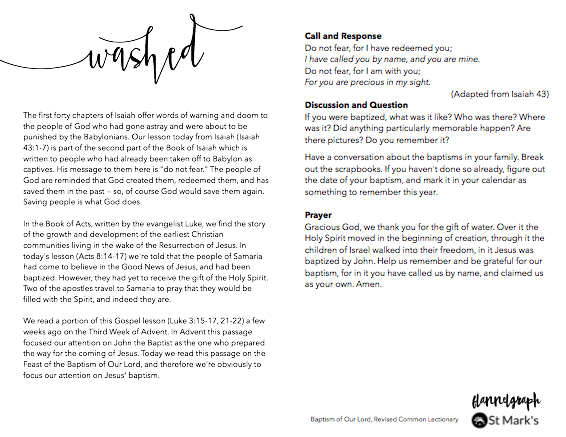 n it Jesus was baptized by John. Help us remember and be grateful for our baptism, for in it you have called us by name, and claimed us as your own. Amen.
n it Jesus was baptized by John. Help us remember and be grateful for our baptism, for in it you have called us by name, and claimed us as your own. Amen.
flannelgraph: advent 4c
Mary, pregant with Jesus, has left her home and gone to be with her older cousin Elizabeth, who happens to also be pregnant with John the Baptist (Luke 1:39-55). I tend to think that Mary comes to the home of Elizabeth and Zecharish to seek refuge from the her own small-town life where being an unwed pregant woman would have gotten difficult. She does not come timidly though, for she bursts out in song, singing the Magnificat; a song based on some of the great songs of the Hebrew Bible, which regails us with the reminder of God’s heart for the least of those among us.
In Hebrews today (Hebrews 10:5-10), a New Testament sermon by an unknown author, we hear that the coming of Christ fundamentally shifts the relationship with God and God’s People, especially regarding the cultic practice of sacrifice. No longer do the bodies of animals need to be offered, for it’s Jesus’ body that is offered to us; first in the manger, then on the cross.
The Book of the Prophet Micah (Micah 5:2-5a) is not a particularly happy one. Micah had harsh words for a people who were living in sin and forsaking their covenant relationship with God. But, in one of the more tender sections of Micah’s writing we find God’s plan to come forth from an insignificant town which was part of a small clan. Micah warns his readers of all that will befall them if they do not walk in the ways of God, but he also comforts them with the image of a shepherd-God who will stand and tend to his flock.
Prayer
My soul proclaims the greatness of the Lord
My spirit rejoices in God my Savior.
God has come to the help of his servant,
For he has remembered his promise of mercy.
The promise he made to our forebearers,
to Abraham and his children for ever.
Reflection
Put yourself in Mary’s shoes. What would it have been like for her? What might she have been feeling? If you were Elizabeth and Zechariah greeting her at your door, what would you say to her? How would you take care of her?
Prayer
Gracious God, in sending your son among us, you have shown the strength of your arm. As you sent your son to Bethlehem in ages past, we pray you to send your son to us today, that we might proclaim your greatness, and that our spirit may rejoice. Amen.
flannelgraph advent 3c
The third Sunday of Advent is also known as “gaudete,” the Latin word for “rejoice.” It takes its name from the words of our epistle lesson today (Philippians 4:4-7), part of which was traditionally sung on the third Sunday of Advent when we are preparing for the impending joy of the celebration of the Incarnation. This is the day when the rose colored candle on the advent wreath is lit, and in some places rose colored vestments are used.
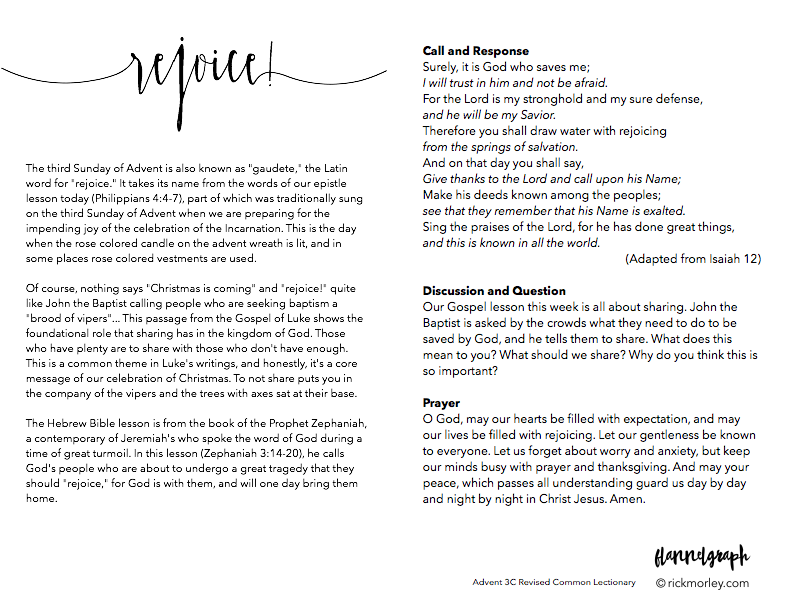
Click on the image above for the PDF version of this flannelgraph.
Of course, nothing says “Christmas is coming” and “rejoice!” quite like John the Baptist calling people who are seeking baptism a “brood of vipers”… This passage from the Gospel of Luke shows the foundational role that sharing has in the kingdom of God. Those who have plenty are to share with those who don’t have enough. This is a common theme in Luke’s writings, and honestly, it’s a core message of our celebration of Christmas. To not share puts you in the company of the vipers and the trees with axes sat at their base.
The Hebrew Bible lesson is from the book of the Prophet Zephaniah, a contemporary of Jeremiah’s who spoke the word of God during a time of great turmoil. In this lesson (Zephaniah 3:14-20), he calls God’s people who are about to undergo a great tragedy that they should “rejoice,” for God is with them, and will one day bring them home.
Call and Response
Surely, it is God who saves me; *
I will trust in him and not be afraid.
For the Lord is my stronghold and my sure defense, *
and he will be my Savior.
Therefore you shall draw water with rejoicing *
from the springs of salvation.
And on that day you shall say, *
Give thanks to the Lord and call upon his Name;
Make his deeds known among the peoples; *
see that they remember that his Name is exalted.
Sing the praises of the Lord, for he has done great things, *
and this is known in all the world.
(From Isaiah 12:2-5)
Reflection
Our Gospel lesson this week is all about sharing. John the Baptist is asked by the crowds what they need to do to be saved by God, and he tells them to share. What does this mean to you? What should we share? Why do you think this is so important?
Prayer
O God, may our hearts be filled with expectation, and may our lives be filled with rejoicing. Let our gentleness be known to everyone. Let us forget about worry and anxiety, but keep our minds busy with prayer and thanksgiving. And may your peace, which passes all understanding guard us day by day and night by night in Christ Jesus. Amen.
flannelgraph: advent 2c
Eastern Orthodox icons often depict John the Baptist with wings. Strange, right? He’s showed as a winged man, not because anyone thinks that he actually had wings, but because he was a “messenger,” sent to proclaim the coming of the Messiah. And, the Greek word for “messenger” is the
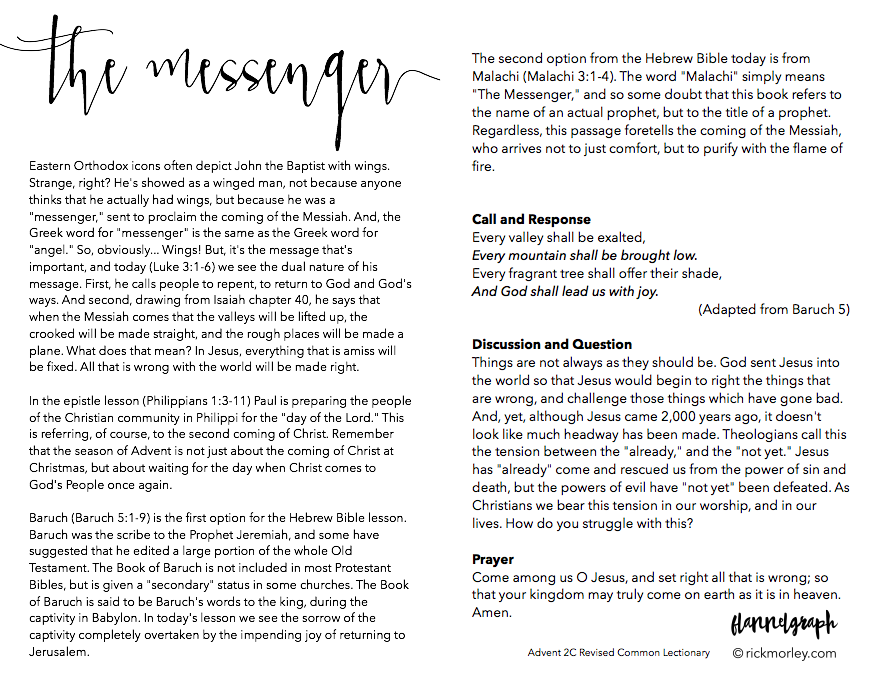
Click on the image above to download the PDF.
same as the Greek word for “angel.” So, obviously… Wings! But, it’s the message that’s important, and today (Luke 3:1-6) we see the dual nature of his message. First, he calls people to repent, to return to God and God’s ways. And second, drawing from Isaiah chapter 40, he says that when the Messiah comes that the valleys will be lifted up, the crooked will be made straight, and the rough places will be made a plane. What does that mean? In Jesus, everything that is amiss will be fixed. All that is wrong with the world will be made right.
In the epistle lesson (Philippians 1:3-11) Paul is preparing the people of the Christian community in Philippi for the “day of the Lord.” This is referring, of course, to the second coming of Christ. Remember that the season of Advent is not just about the coming of Christ at Christmas, but about waiting for the day when Christ comes to God’s People once again.
Baruch (Baruch 5:1-9) is the first option for the Hebrew Bible lesson. Baruch was the scribe to the Prophet Jeremiah, and some have suggested that he edited a large portion of the whole Old Testament. The Book of Baruch is not included in most Protestant Bibles, but is given a “secondary” status in some churches. The Book of Baruch is said to be Baruch’s words to the king, during the captivity in Babylon. In today’s lesson we see the sorrow of the captivity completely overtaken by the impending joy of returning to Jerusalem.
The second option from the Hebrew Bible today is from Malachi (Malachi 3:1-4). The word “Malachi” simply means “The Messenger,” and so some doubt that this book refers to the name of an actual prophet, but to the title of a prophet. Regardless, this passage foretells the coming of the Messiah, who arrives not to just comfort, but to purify with the flame of fire.
Family Liturgy
Every valley shall be exalted,
Every mountain shall be brought low.
Every fragrant tree shall offer their shade,
And God shall lead us with joy.
Adapted from Baruch 5
Things are not always as they should be. Some people always seem to prosper, and others always seem to struggle. People always seem to be hurting other people, and while we all say that we want peace we don’t always look like that’s what we want. God sent Jesus into the world so that Jesus would begin to right the things that are wrong, and challenge s that have gone bad. And, yet, although Jesus came 2,000 years ago, it doesn’t look like much headway has been made. Theologians call this the tension between the “already,” and the “not yet.” Jesus has “already” come and rescued us from the power of sin and death, but the powers of evil have “not yet” been defeated. As Christians we bear this tension in our worship, and in our lives. How do you struggle with this?
Come among us O Jesus, and set right all that is wrong; so that your kingdom may truly come on earth as it is in heaven. Amen.
an advent email devotional

Use the form below to sign up for my Advent Email devotional on the family tree of Jesus. Every Monday, Wednesday, and Friday in Advent you’ll get an email with a short piece of scripture, a short reflection, and a prayer to help give your Advent some special spiritual meaning this year.
flannelgraph advent 1c
We normally think of Advent as a time to prepare for Christmas. And, it is. “Advent” means “the coming,” and it is indeed about Christ coming in Bethlehem… But, that’s not all it’s about. Because one of the tenets of our faith is that Christ will come again. And so, each Advent we begin with remembering Jesus’ second coming, before we turn our attention back to Jesus’ first coming. We see this theme in the Gospel lesson (Luke 21:25-36), which comes from the “little apocolypse” in Luke’s Gospel. Jesus says here that he will return, and that there will be signs of that ringing throughout creation. He tells us that we are to be “alert,” and ready to stand before him when we comes.
1 Thessalonians is the earliest Christian document we have, having been written years before anything else in the New Testament. Paul wrote this letter primarily to calm down the anxieties of the Christian community in Thessalonika who were worried that Jesus hadn’t returned yet. In this lesson (1 Thess 3:9-13), Paul prays for them, asking that God would help make their paths cross again so that they could see one another, and that their faith would increase.
Jeremiah was a prophet whose ministry took place in the years leading up to the destruction of Jerusalem and the exile in Babylon. His message was to warn the people to take their covenant with God seriously. In the lesson for today (Jer 33:14-16), Jeremiah is talking about the hope that God has for God’s People after the hardships they will endure. Out of the lineage of King David will come one who will live by righteousness. Of course Christians identify Jeremiah prophesy here as being about the coming of Jesus.
Family liturgy
Show me your ways, O Lord
and teach me your paths.
Lead me in your truth and teach me,
for you are the God of my salvation.
Remember, O Lord, your compassion and love,
for they are from everlasting.
(Adapted from Psalm 25)
In this season of Advent, when we are waiting for the coming of Jesus, how can we remember God’s “compassion and love?” Who does God have compassion and love for? Who are we supposed to have compassion and love for?
Create an action-plan for who you can show compassion and love for this week.
Come among us O God, and remember your compassion and love; so that when your Son Jesus arrives, we might come to adore him, and spread your compassion and love to the ends of the earth. Amen.
why we can’t be afraid
“Do not be afraid,” is the single most often repeated command in the Bible, having been issued about a hundred times.
God told us not to fear. (e.g. Gen 15:1) Moses told us not to fear. (e.g. Exodus 14:15) Angels told us not to fear. (e.g. Matthew 28:5) The psalmists told us not to fear. (e.g. Psalm 23:4) Jesus told us not to fear. (e.g. Luke 12:7).
I’ve preached on “do not be afraid” countless times. I have to say, it feels good to say to a congregation. It feels good to say, period. As if God intended this command as a form of spiritual Xanax, to set us as ease, and to make us feel safe and secure, come what may.
But, lately I’m beginning to think that this command is meant to do more than merely assuage us. I think it’s meant to challenge us to be our best selves, and to uphold the basic tenets of the Gospel. Because when we are afraid we are rarely at our best. Fear can dredge up suspicion, hatred, and an unyielding desire to inflict pain and retribution on others. Fear can cause us to cast off our neighbor, and cross to the other side of the road when we see a person in need stuck in a ditch. Fear can make us completely abandon compassion, mercy, love of neighbor, and sometimes even just plain reason.
When we fear, we can so totally abandon all that God calls us to, and all that Jesus taught us to be.
Today, when I look at the world in the wake of the terror attacks in Paris, I see us being driven more by a visceral reaction to the ideology of ISIS than by the ideology of Jesus. We say, Jesus calls us to be people of compassion… But, not now. We say, Jesus calls us to love our neighbor… But, he couldn’t possibly mean these people. We say, Jesus calls us to love our enemies and pray for them… But, not this enemy. We say, Jesus calls us to welcome and care for the stranger and those in need… But, not in my state.
Because compassion and love seem wildly naive in the face of all we are dealing with. And, maybe they are.
But, I’m sticking with Jesus anyway.
I’m not saying that we shouldn’t fight ISIS or screen refugees. I think we need to do both – for our safety, and for the safety of all the targets of ISIS.
But, we cannot lose our souls in the process. We cannot lose ourselves to hatred and an appetite to inflict revenge. We cannot allow them to make us so afraid that we forsake the Way of Jesus. For that is when they win.
They can’t bomb every church, behead every Christian, or shoot up every concert. But, if we allow them to hijack the faith that God has given us, then with our help they may very well succeed in eradicating Jesus from the world.
So do not fall prey to hatred. Do not fall prey to suspicion and discrimination. Do not forget to love your neighbor, and do not forget who your neighbor is. Do not succumb to revenge seeking.
And, most importantly: Do not be afraid.
Lazarus
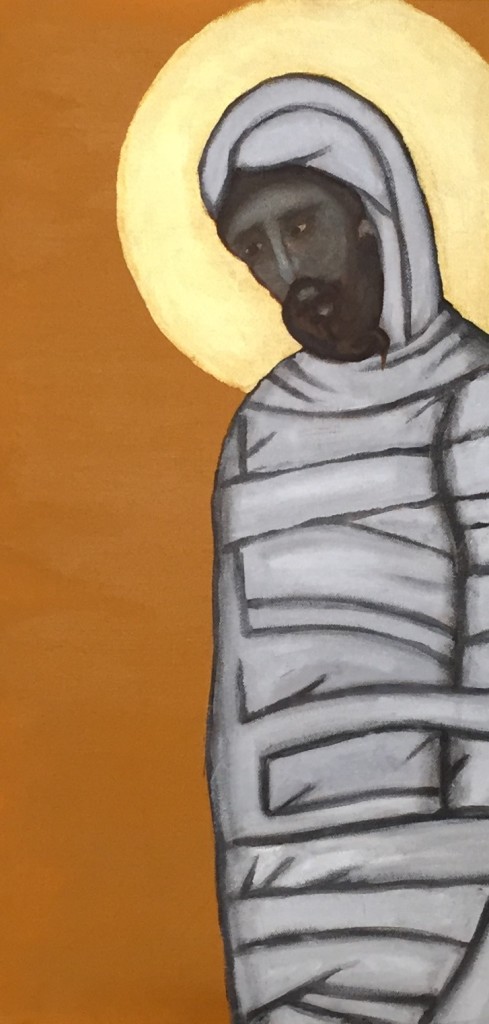
Lazarus. 12×24 acrylic on canvas. 2015. Rick Morley
